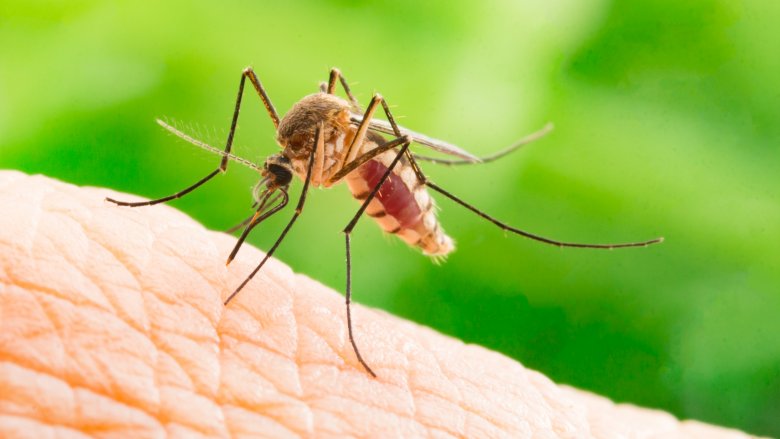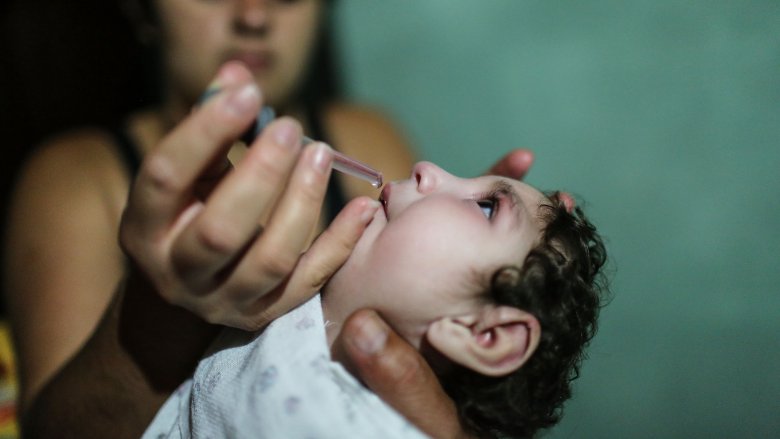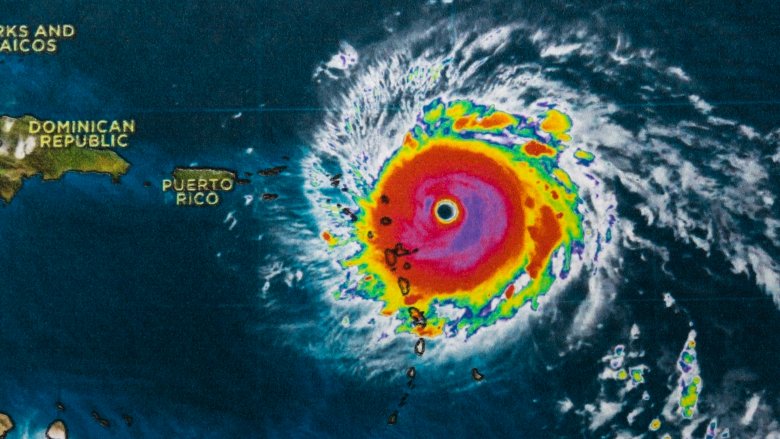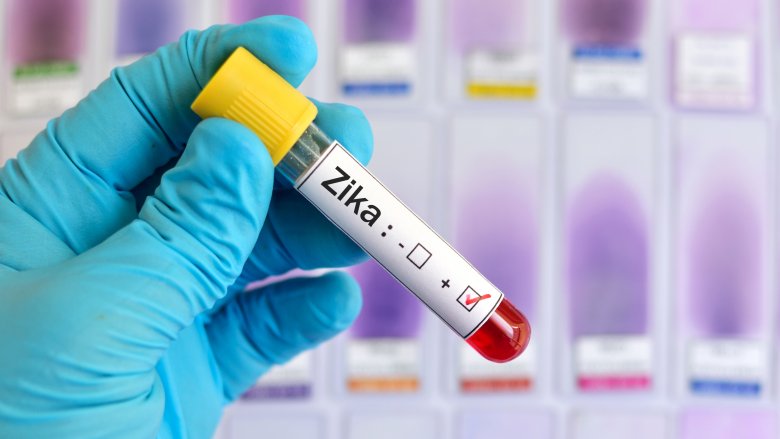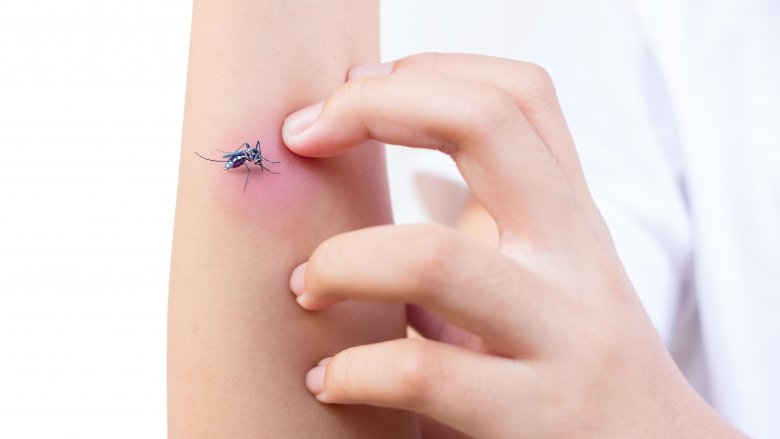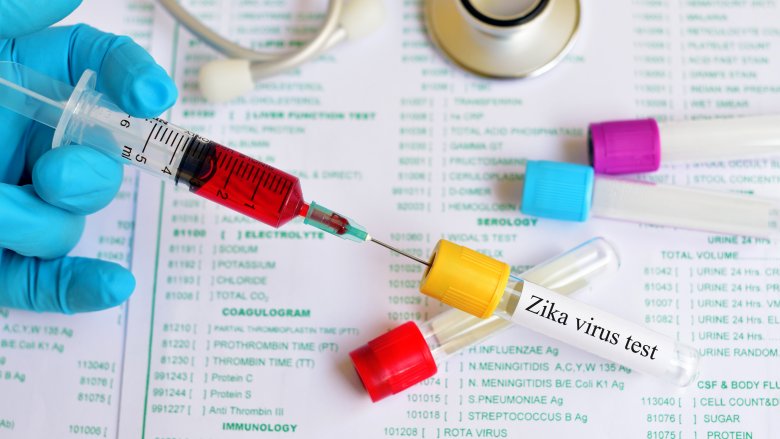The Untold Truth Of The Zika Virus
If you have been pregnant in the last year, chances are you've been a little paranoid around mosquitoes because of the Zika virus. Zika seemed to come out of nowhere and suddenly ruin all our travel plans and pregnancy timelines.
Zika is a virus spread by mosquitoes and causes mild symptoms in adults like fever and a headache. It also causes serious birth defects, so has gotten a lot of attention. The scary part about Zika is that there is still so much unknown. However, here are some facts we do know.
Its birth defects are serious
In 2016, the Centers for Disease Control and Prevention (CDC) concluded that Zika causes microcephaly in unborn infants when their mothers are exposed to the virus. Microcephaly means the baby's head is much smaller than is normal. When a baby's head is too small, his or her brain can't develop normally.
"This study marks a turning point in the Zika outbreak. It is now clear that the virus causes microcephaly. We are also launching further studies to determine whether children who have microcephaly born to mothers infected by the Zika virus is the tip of the iceberg of what we could see in damaging effects on the brain and other developmental problems," Director of the CDC Tom Frieden, MD, MPH said is a press release. "We've now confirmed what mounting evidence has suggested, affirming our early guidance to pregnant women and their partners to take steps to avoid Zika infection and to health care professionals who are talking to patients every day. We are working to do everything possible to protect the American public."
This finding is so concerning because these birth defects are permanent. "These type of defects cannot be fixed. They may lead to blindness," Dr. Tara Narula told CBS This Morning.
It harms adult brains too
Most of the news about Zika has focused on its birth defects, but adult brains are at risk too. The effects are not the same, but Zika could still affect each of us. When researchers infected adult mice with Zika, they found that certain brain cells died from the virus.
"Our results are pretty dramatic... the virus wasn't affecting the whole brain evenly, like people are seeing in the fetus. In the adult, it's only these two populations that are very specific to the stem cells that are affected by virus," study author Joseph Gleeson told Dr. Pat Salber for Medium. "These cells are special, and somehow very susceptible to the infection."
Researchers are not sure why adults don't seem to have symptoms of these brain changes when they are sick with Zika. We also don't know if human brains are affected the same way as the mice brains were. It's safe to say that more research will be coming out about this possible link.
Men can spread it without knowing
It is not just the mosquitoes buzzing around that could infect you with Zika. The culprit may be sleeping next to you. Men who have been exposed to Zika and have no symptoms whatsoever can pass the disease to their partners through sex. If your partner has been to a Zika area lately and feels fine, it is still important to use condoms to prevent being exposed to Zika.
The fact that men can spread it without their knowledge "illustrates the need for careful precautions when visiting an area where Zika is circulating," Medical Epidemiologist Dr. John Brooks told CNN. "Be sure to wear insect repellent and appropriate clothing, and use CDC guidance on safe sex when you return. This is especially critical for women who are pregnant or trying to conceive and their partners."
If you are already pregnant and your partner recently traveled, talk with your doctor about when it will be safe to have unprotected sex again. "Pregnant couples need to defer unprotected sexual contact for the entire pregnancy, even if the exposed partner never develops symptoms of Zika," explained Dr. Brooks. "A few months of precautions can prevent devastating lifelong defects for the developing fetus."
Relief efforts were delayed by Congress
When Zika hit the United States, I like others assumed that our country would jump to take care of the problem. However, it seemed that Congress' response was slow and flawed. Congress did not authorize funding for Zika treatment and prevention right away, which meant researchers and healthcare providers couldn't do their jobs.
On August 27, 2016, President Obama addressed his concerns on his weekly address and pretty much laid into Congress after outlining precautionary measures. "But every day that Republican leaders in Congress wait to do their job, every day our experts have to wait to get the resources they need — that has real-life consequences," President Obama said. "Weaker mosquito-control efforts. Longer wait times to get accurate diagnostic results. Delayed vaccines. It puts more Americans at risk."
The president called on Congress to move past partisan politics and address this problem. "...Republicans in Congress should treat Zika like the threat that it is and make this their first order of business when they come back to Washington after Labor Day. That means working in a bipartisan way to fully fund our Zika response," he said.
Zika has been around since the 1940s
To many of us, it seemed like Zika popped up overnight. One minute we're planning our Caribbean getaway, the next we're readings about airline refund policies and learning that Zika has even hit our own country. Zika is not new though. It was actually discovered in a monkey in the 1940s. It was found in humans in Uganda and Tanzania in 1952 and found again in Nigeria in 1968. The first major Zika outbreak happened in 2007 on the island of Yap in Micronesia.
You can protect yourself with DEET
The best way to protect yourself against Zika is to protect yourself against the mosquitoes that carry it. That means covering up, using mosquito nets when necessary, and investing in a good insect repellent. "Repellents containing DEET (N,N-diethyl-m-toluamide for those of you who care) have the best documentation of effectiveness against mosquitoes," Founder of The Doctor Weighs In and Board Certified Emergency Physician and Internist Patricia Salber wrote in Space Coast Daily. "It comes in concentrations of between 5-100 percent. Although higher concentrations last longer, there is no added benefit to going above 50 percent."
DEET isn't perfect and does come with side effects, so it's important to talk with your doctor about any questions or concerns. "Serious side effects in kids, such as toxic encephalopathy (a brain disorder) has been reported with prolonged or excessive use that sometimes included drinking it," warned Dr. Salber. "Relevant to the current concern over Zika, the CDC also considers DEET-containing formulations that are registered with the EPA to be safe for use during pregnancy."
Hurricanes can make the spread worse
Communities hit with hurricanes usually have months or even years of cleanup and financial recovery, but now they have another worry to add to the list. It seems that mosquitoes love hurricane conditions.
"The Zika virus is transmitted through mosquito bites. To prevent contracting the Zika virus, the public should attempt to prevent mosquito bites and use condoms for prevention of transmission from infected person to non-infected person," Professor of Pediatrics at the University of Arizona College of Medicine-Phoenix David H. Beyda told me. "The recent hurricanes can increase the chance of contracting Zika as pools of water are breeding grounds for mosquitoes." If you have recently experienced a hurricane, make sure to dump any standing water near your home.
Treating your clothes may prevent mosquito bites
If you or your partner need to visit an area where Zika is prevalent, you are most likely feeling uneasy about the situation. For a little peace of mind, consider treating your clothing to repel mosquitoes. The solution permethrin can stay on clothes and prevent mosquito bites.
"Consider using permethrin-treated clothing and gear (such as boots, pants, socks)," Dr. Beyda wrote in The Differential. "You can buy pre-treated clothing and gear or treat them yourself. So it comes down to this: common sense, an attitude of caution if you are female and wanting to get pregnant or are pregnant. As for the guys, protected sex with your pregnant or intending to get pregnant partner/spouse."
Cover up to protect yourself
Another way to prevent mosquito bites is to simply wear more clothing. They can't bite you if they can't find your skin, right?
"The best way to prevent mosquito bites is to wear long-sleeved shirts and long pants, and treat your clothing and gear with permethrin or buy pre-treated items," Internal Medicine Physician Runjhun Misra told me. "You can also protect yourself by staying in places with air conditioning and window and door screens, or that use mosquito netting."
There is no vaccine to prevent Zika
Unfortunately there is no vaccine for Zika, so that is why there is such a focus on preventing it with mosquito precautions and protected sex.
"Zika is spread mostly by the bite of an infected Aedes species mosquito and can be passed from a pregnant woman to her fetus. Infection during pregnancy can cause certain birth defects," explained Dr. Misra. "It can be sexually transmitted, so abstain from sex or wear condoms. It's important to know that there is no vaccine or medicine for Zika."
Zika won't affect future pregnancies
Finally some good news! While Zika can be devastating for pregnant women, it shouldn't affect future pregnancies. So if you and your friends just returned from a girls' trip in Mexico, you can still have safe pregnancies in the future.
"After the virus has cleared the body, Zika isn't known to affect future pregnancies," said Connie Mitchell, MD, MPH, the Deputy Director for the Center for Family Health at the California Department of Public Health. "However, it's always a good idea to take caution to prevent mosquito bites, because these insects carry other diseases, too. Make sure you talk to your doctor about your plan for having children, and learn how to be safe and healthy before becoming pregnant." Talk with your doctor about how long to wait before becoming pregnant.
Zika takes six months to clear your body
While the Zika virus itself is pretty mild for adults, it can hang out in your body for quite a while. "Men who have possibly been exposed should practice safe sex for at least six months after travel to a Zika-affected country," explained Dr. Mitchell. "Women who have possibly been exposed should practice safe sex for at least eight weeks after travel. A little prevention can go a long way!"
The only way to have safe sex after being exposed to Zika is to use condoms. This applies even if you are already pregnant. "If you are pregnant, and your male partner may have been exposed to Zika, you should practice safe sex by using condoms for at least six months after your male partner's last possible Zika virus exposure," Physician and Biomedical Researcher with expertise in viral infections Dena Grayson echoed.
"You may need to be tested to see if you were infected and learn how this might affect your pregnancy," urged Dr. Mitchell. "If you travel frequently to a Zika-affected area, you may also need testing more than once."
Zika is spread by one type of mosquito
Even though Zika seems to be taking over the world, it can only be carried and spread by one specific type of mosquito. "Zika is virus is principally transmitted through the bite of Aedes mosquitoes," Board Certified Infectious Disease Physician Amesh A. Adalja told me. "These mosquitoes are widespread worldwide and in the United States, so it was not surprising to see local spread of the virus in Puerto Rico, the US Virgin Islands, Florida, and Texas."
Because we have no idea which type of mosquito is biting us on vacation, it is important to protect yourself at all times. "To protect oneself from Zika, it is important to practice mosquito avoidance behaviors which include using mosquito repellents, wearing appropriate clothing when in high mosquito density areas, dumping standing water that serves as breeding grounds for mosquitoes, and practicing safe sex for several months if you or your partner was in an area in which Zika is present," advised Dr. Adalja.
Most infected people don't have symptoms
Just because you felt fine after your Costa Rican honeymoon does not mean you weren't exposed to Zika. Many adults never even notice symptoms of being sick. "Most cases of Zika have no symptoms, yet can still be transmitted to mosquitoes, a developing fetus, or another person," explained Dr. Adalja.
Because Zika's effects on a pregnancy can be so devastating, it is definitely worth it to be safe, even when you feel fine. Six months of condoms is a lot better than irreversible birth defects.
How to protect your home against mosquitoes
Because the only way to treat Zika is to prevent it, being prepared is key. Of course avoiding areas of the country and world where Zika is a risk is the best precaution. However, for those living in Zika areas, you can still protect yourself.
Make sure your home is air conditioned or has good screens to prevent mosquitoes from coming in. Unfortunately the mosquitoes that carry Zika like to hang around homes, so make your home less inviting for them. Mosquitoes like to live near standing water, so make sure to take care of any large puddles, animal water dishes, or flower pots where water could collect. Always wear protective clothing and insect repellant when you go outside.
It's not just pregnant women at risk
As a woman of childbearing age, I am acutely aware of the Zika risk. However, it is just as crucial for my husband, parents, and kids to be concerned, because it can affect anyone. While it is rare, Zika can cause Guillain-Barre Syndrome (GBS) in adults. GBS is a serious neurologic condition in which your immune system actually attacks your nervous system.
"It's a small percentage of people who would get that, but it's still a risk," Director of the CDC's division of vector-borne diseases Dr. Lyle Petersen told Time.
There is no treatment for Zika
One reason why Zika is so scary is because there is no medical treatment. "Treatment is generally supportive and can include rest, fluids, and use of analgesics and antipyretics," explains the CDC. "Because of similar geographic distribution and symptoms, patients with suspected Zika virus infections also should be evaluated and managed for possible dengue or chikungunya virus infection. Aspirin and other non-steroidal anti-inflammatory drugs (NSAIDs) should be avoided until dengue can be ruled out to reduce the risk of hemorrhage."
It is also crucial for people infected with Zika to stay away from mosquitoes. Even though they already have Zika, there are other mosquitoes carrying other diseases that could really complicate the situation.
Only a lab test can confirm a Zika diagnosis
If you are concerned that you have been exposed to Zika, it's important to see your doctor right away. She will ask a lot of questions about recent travel and any new symptoms. The only way to know for sure is to send a test to the lab. Your doctor would most likely order a blood test, but other bodily fluids will also work, such as urine or saliva. Charming, right?
There is a lot we don't know
While it seems that there is so much Zika information to digest, it is truly just the tip of the iceberg. More research is being conducted every day because there is so much we don't know, such as the long-term effects of being exposed. This is a very different picture than other types of outbreaks. "This emergency is because of what's unknown," Infectious Disease Professor at the London School of Hygiene and Tropical Medicine David Heymann told the Washington Post. "The Ebola emergency was because of what was known."
More research is needed to know how to support pregnant women and their families. "If my daughter had gotten Zika two years ago, and she wanted to get pregnant, I would say, 'Don't worry,'" Director of the CDC's National Center for Emerging and Zoonotic Infectious Diseases Dr. Beth Bell told Time. "But we don't know how long that immunity lasts. Is it lifelong? Is it five years? We don't have an answer."
